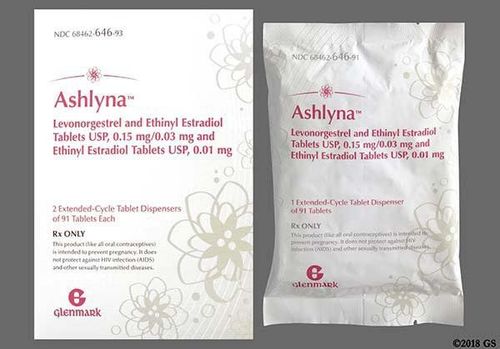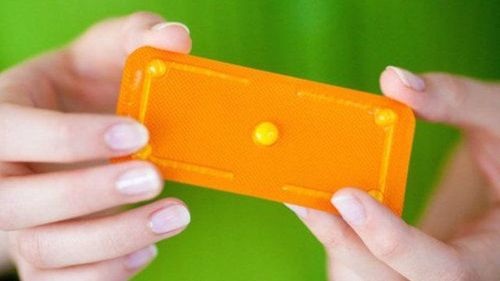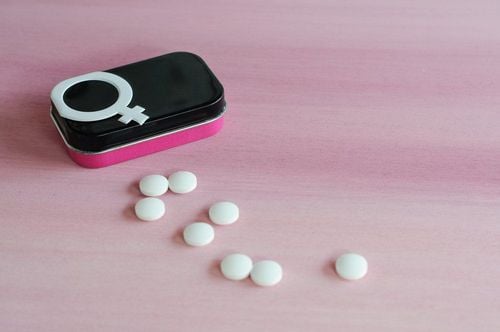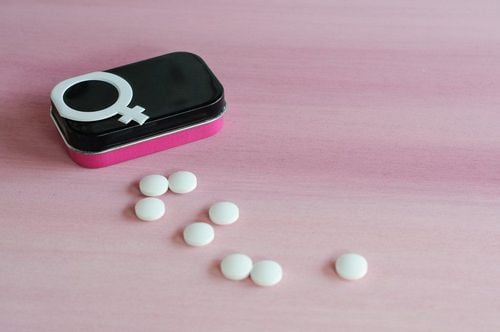This is an automatically translated article.
Pregnancy and childbirth is a woman's natural destiny, but unintended pregnancy can lead to many health risks for women and affect the family economy. To prevent this, women can use combined hormonal contraceptives, including the drug Ethynodiol. So how does Ethynodiol work in preventing pregnancy?
1.What does ethynodiol do? Ethynodiol is a hormonal contraceptive that combines a progestin and an estrogen. The main mechanism of contraception of ethynodiol is to prevent ovulation during a woman's menstrual cycle. Besides, some other contraceptive mechanisms of ethynodiol include:
Thickening of vaginal fluid and preventing sperm from reaching an egg; Changes the lining of the uterus to prevent a fertilized egg from implanting and being eliminated from the body. In addition to preventing pregnancy, ethynodiol also helps regulate menstruation, reduce blood loss and abdominal pain during menstruation, limit the risk of ovarian cysts and treat acne. All birth control pills (including ethynodiol) do not protect the user or partner from contracting sexually transmitted diseases (such as HIV, gonorrhea, chlamydia).
2. How to use ethynodiol Read the instructions for use on the product packaging or your pharmacist's instructions carefully before you start using ethynodiol. These instructions are important about when to take ethynodiol and what to do if a dose is missed.
Ethynodiol is an oral contraceptive, taken as directed by your doctor once a day. Users should choose an easy to remember time of day and maintain the habit of taking birth control pills at the same time each day.
For effective contraception, it is very important to use ethynodiol exactly as prescribed by your doctor. The amount of estrogen and progestin in each ethynodiol pill will vary depending on when in the cycle the pill is taken. Therefore, the user must follow the instructions on the package to find and take the first pill, then take the remaining pills in the correct order and must not skip any pills.
Vomiting or diarrhea may prevent ethynodiol from being effective as a contraceptive. People taking ethynodiol for this condition may need to use a backup method of birth control (such as condoms, spermicide).
Taking ethynodiol after the evening meal or at bedtime may be helpful for people who experience stomach upset or nausea while taking it. However, users may choose to take their ethynodiol at a different time of day that is easier to remember. Note, no matter what time it is, the most important thing is to take ethynodiol at the same time every day, 24 hours apart.
Ethynodiol pill pack includes 21 active pills (with hormones). Use active pills every day for 21 consecutive days:
If the pack contains 28 pills, the user should take the inactive pill every day for the last 7 days after finishing all active pills. For a pack of only 21 pills, the user should not take any pills for 7 days after the end of the 21 pills, unless otherwise directed by the doctor. Usually, menstruation will appear in the fourth week of the pill cycle. After taking the last inactive pill or going 7 days without taking a pill, the user should start a new pack the next day with or without a period.
If this is the first time using ethynodiol and not switching from a hormonal contraceptive (such as the patch or other birth control pills), the user should take the first pill in the pack on the first Sunday after the start of the menstrual cycle or on the first day of the menstrual period.
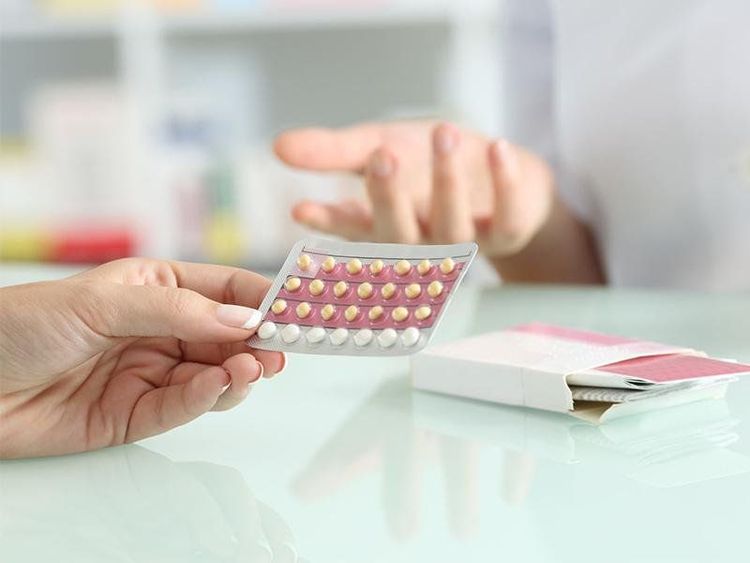
Phụ nữ cần sử dụng thuốc Ethynodiol theo đúng chỉ dẫn của Dược sĩ
For the first cycle, users need to use an additional non-hormonal method of birth control (such as condoms, spermicide) for the first 7 days to wait for the pill to have enough time to work. . Talk to your doctor or pharmacist about switching from other forms of hormonal birth control (such as the patch, birth control pill) to ethynodiol.
3. Ethynodiol Side Effects Common side effects of ethynodiol include nausea, vomiting, headache, bloating, chest tightness, swelling ankles/feet (due to increased fluid retention) or changes. weight change.
Vaginal bleeding between periods or missed periods/irregular periods may occur, especially during the first few months of use. If any of the side effects of ethynodiol persist or get worse, tell your doctor or pharmacist immediately. If you have missed your period for 2 consecutive periods (or 1 period if you have not used the medicine correctly), the user should contact the doctor to take a pregnancy test.
Ethynodiol can increase the user's blood pressure, so check your blood pressure regularly and let your doctor know if the results are high.
Some other serious side effects of ethynodiol , including:
A lump in the breast; Mental/mood changes such as new or worsening depression; severe stomach or abdominal pain; Vaginal bleeding changes abnormally such as continuous bleeding, sudden heavy volume, missed period; Dark urine, yellow eyes, yellow skin. Ethynodiol can cause very serious (sometimes fatal) side effects from blood clots (such as deep vein thrombosis, coronary artery disease, pulmonary embolism, stroke). Immediately notify the doctor when the user has the following symptoms after taking ethynodiol:
Pain or heaviness in the chest behind the breastbone, the pain may spread to the jaw or down the left arm; Confusion, dizziness/sudden fainting; Pain, swelling, warmth in the lower leg; Difficulty speaking; Sudden shortness of breath, rapid breathing; Unusual headache; Unusual sweating; Weakness on one side of the body; Vision changes (such as double vision, partial/complete blindness). 4. Some precautions when using ethynodiol Before using Ethynodiol oral contraceptives, users should tell their doctor or pharmacist if they are allergic to any type of estrogen (such as ethinylestradiol, mestranol) or any type of progestin (such as norethindrone, desogestrel) or any other allergies.
Some medical history should be considered before using ethynodiol:
History of blood clots in the legs, lungs; Blood clotting disorders; High blood pressure; Abnormal breast exam; Cancer (such as endometrial cancer, breast cancer); Increased cholesterol or triglycerides; Depression; Diabetes mellitus; Family or personal history of angioedema; Gallbladder problems; Severe headache or migraine; Cardiovascular disease (such as heart valve disease, irregular heartbeat, coronary artery disease); History of yellow eyes, jaundice during pregnancy, or jaundice when using hormonal contraceptives (pill, patch); Kidney disease, liver disease; Stroke; Swelling, edema; Thyroid problems ; Unexplained vaginal bleeding.

Phụ nữ có tiền sử dị ứng ethynodiol cần báo với bác sĩ ngay
Diabetics using the drug ethynodiol may affect blood sugar levels. People taking ethynodiol should check their blood sugar as often as directed and share the results with their doctor. Notify your doctor immediately if you have symptoms of hyperglycemia such as increased thirst, frequent urination, then your doctor may need to adjust the dose of diabetes medication, exercise program or patient's diet.
Note that if the user has just / is about to have surgery or is about to be seated for a long time (such as a long flight) there will be an increased risk of blood clots (thrombosis), especially while using this method. hormonal contraception. The user may then need to stop taking ethynodiol for a while or take special precautions.
The birth control pill ethynodiol can cause dark areas on the face and cause melasma. The sun is a factor that worsens this condition, so limit your time in the sun, use sunscreen and wear protective clothing to protect your skin when you go outside.
If you are nearsighted or wear contact lenses, people taking ethynodiol may have vision problems or have difficulty wearing contact lenses while using the drug.
One thing to keep in mind is that it can take longer to get pregnant after stopping the birth control pill ethynodiol. Ethynodiol is not recommended for use during pregnancy. If you become pregnant or think you may be pregnant while taking ethynodiol, tell your doctor right away.
Women who have recently given birth or have had a miscarriage/abortion within 3 months need to talk to their doctor about reliable birth control methods and learn when it is safe to start using estrogen-containing contraceptives (like the drug ethynodiol). Ethynodiol may decrease breast milk production and small amounts of it pass into breast milk and may cause unwanted effects on a nursing infant.
5. Ethynodiol Drug Interactions Drug interactions can change the way ethynodiol works or increase your risk of serious side effects. Some medicinal products that can interact with ethynodiol include:
Aromatase inhibitors (such as anastrozole, exemestane); Ospemifene; Tamoxifen; Tizanidine; Tranexamic acid; Combination drugs for chronic hepatitis C (ombitasvir/paritaprevir/ritonavir with/without dasabuvir). Some medications can make hormonal birth control less effective by inhibiting the body's production of reproductive hormones, which can lead to an unwanted pregnancy. Good examples include:
Griseofulvin; Modafinil; Rifamycins (such as rifampin, rifabutin); Medicines used to treat seizures (such as barbiturates, carbamazepine, felbamate, phenytoin, primidone, topiramate); HIV medicine (such as nelfinavir, nevirapine, ritonavir); Let your doctor know when you're starting any new medication and discuss whether additional reliable birth control should be used. Also, notify your doctor if you experience unusual spotting, as these could be signs that your birth control isn't working properly.
Ethynodiol can interfere with some laboratory tests (such as blood clotting factors, thyroid function), causing false results.
Symptoms of an ethynodiol overdose may include severe nausea and vomiting, and sudden/unusual vaginal bleeding.

Thuốc ethynodiol có thể tương tác với một số loại thuốc khi tự ý kết hợp
Users should adhere to follow-up appointments and tests, should have regular physical examination, including laboratory tests (such as blood pressure measurement, breast exam, pelvic exam, cervical smear test). supply) to monitor health progress and check for side effects.
Refer to the instructions for use on the product packaging for information on the missed dose of ethynodiol. If you frequently forget to take your ethynodiol pill as directed, you should contact your doctor to discuss switching to another form of birth control.
Please dial HOTLINE for more information or register for an appointment HERE. Download MyVinmec app to make appointments faster and to manage your bookings easily.
Reference source: webmd.com



